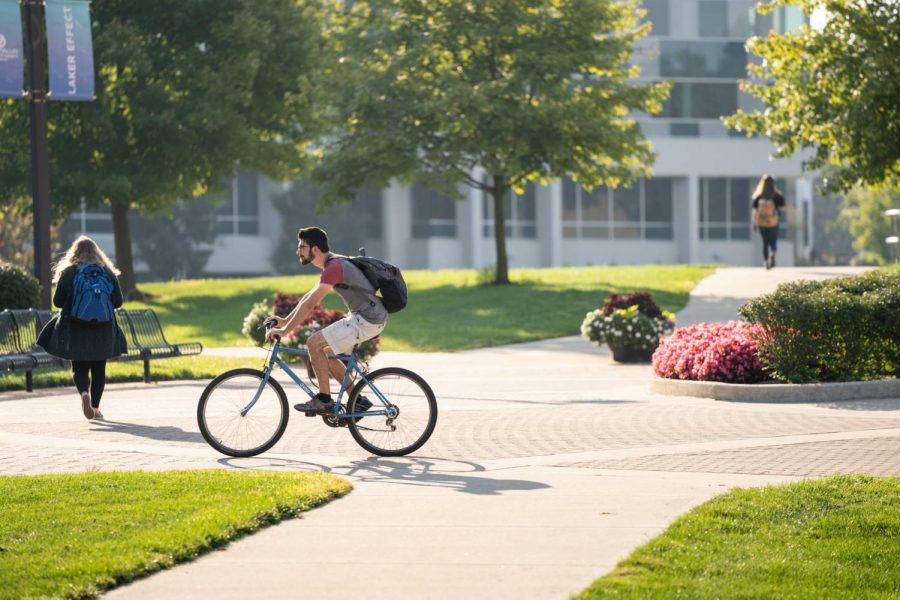GV student commuters detail their college experiences
Jan 13, 2020
As a freshman, Ashton Maurer-Wagner drove from his home near Grand Haven, Michigan to Grand Valley State University’s Allendale campus for class every weekday.
According to information provided on GVSU’s website, approximately 15 percent of incoming students commute to campus, either from home where they live with family or an off-campus apartment.
Maurer-Wagner braved the 20 to 30-minute commute during his freshman year in order to save money for the future. Maurer-Wagner said that the decision to commute helped him save money that he used to live closer to campus as a sophomore.
“For me, it was a money situation,” Maurer-Wagner said. “It was helpful to save money for things down the road.”
Chris Swank, Manager of Operations for Facilities Services at GVSU, said Transportation Services at GVSU offer sustainable and cost-saving transportation options to faculty, staff and students including the bus service, resources on carpooling and bike rental.
“It’s a cost-saving alternative so students do not have to own a car,” Swank said. “They can choose to live off-campus, downtown or along any of the bus routes. It also gives them the opportunity to go to Grand Rapids and not have to worry about parking as well as be responsible while enjoying downtown. For those who do choose to commute to campus, they can also take advantage and ride the bus to campus by parking in one of the park and ride lots, which can be helpful in bad weather as they won’t have to worry about driving the entire way.”
Maurer-Wagner said that living closer to campus offers many more opportunities and ways to get involved.
“I definitely enjoy the experience being closer to campus because it’s easier to participate in like clubs or intramural sports, which I wasn’t really able to do because I was restricted to having to drive home,” Maurer-Wagner said.
Mitchell Dejong, a fourth-year student at GVSU who grew up in Allendale, has also been commuting since his freshman year. Dejong said that commuting to campus impacts the way he schedules his classes.
“I try to schedule most of my classes in bigger blocks because once I’m here, I’m here,” DeJong said. “So while I’m on campus, I’m working, whether that’s studying on my downtime, being in class or working.”
Dejong said that he often arrived to campus early in the morning due to limited parking spaces in commuter lots.
“I had a commuter pass for the first three years, and that’s really what got me stuck into this routine of getting on campus early because once you’re there past 10 a.m., good luck,” Dejong said. “I salute you if you can find a spot.”
Since moving to an apartment closer to campus, Dejong said he either walks or takes a bus to campus instead of driving.
Student commuter parking passes for 2019-2020 cost $230 a semester, according to the GVSU parking services website.
Maurer-Wagner said that not having to commute to campus makes his schedule much more flexible, and makes it easier for him to schedule important meetings with professors and advisors.
“If I had meetings, I had to set those up a week or so beforehand, just so I could make sure that I had enough time to do those,” Maurer-Wagner said.
Maurer-Wagner said that GVSU did a good job of welcoming commuter students and connecting them with each other during welcome week and that he appreciated professors’ understanding of his situation.
“It was kind of nice to know that other people were in the same situation, especially as a freshman,” Maurer-Wagner said. “Some days I wouldn’t be able to make it to school because my roads weren’t plowed or something like that, but my professors were usually supportive about that which was nice.”
Dejong said that commuting to campus has impacted the relationships he forms with other students in ways students who don’t commute may not experience.
“Unless I’m putting in that extra effort to try to form a relationship there, it’s not like I’m around people on my floor or with roommates or whatever,” Dejong said.
Swank said that Transportation Services seek to provide sustainable, accessible options for students, both on and off campus.
“They help the GVSU community lower its carbon footprint by being good stewards to the environment by providing a transportation option that is more sustainable than a single passenger car,” Swank said. “Students going to school have a lot to think about and worrying about how to get there shouldn’t be one of them.”

























